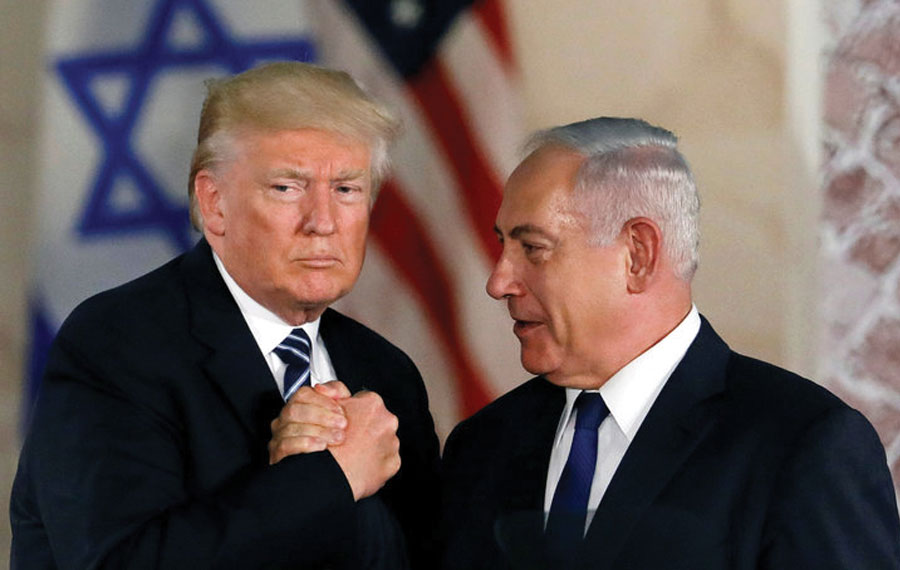 Photo by Ronen Svulun/Reuters
Photo by Ronen Svulun/Reuters When Israeli Prime Minister Benjamin Netanyahu asserted during a recent visit to the White House that the Jewish state had “never had a better friend” than United States President Donald Trump, most citizens back home nodded in agreement. In fact, the U.S. leader’s approval rating is higher in Israel than anywhere else in the world.
Trump has done what most Israelis never imagined possible, foremost by recognizing Jerusalem as Israel’s capital and then moving the U.S. Embassy to the holy city. During Netanyahu’s most recent trip to Washington, Trump officially recognized Israeli sovereignty over the parts of the Golan Heights captured from Syria in the 1967 war.
Equally critical is that, unlike the Obama administration, Trump’s hard-line approach to Iran dovetails with that of the government of Israel, and especially Netanyahu. To this end, the president withdrew from what he called the “disastrous” 2015 nuclear accord aimed at barring Tehran from developing nuclear weapons, and reimposed economic and diplomatic sanctions on the Islamic Republic.
Trump also has implemented financial penalties on Hezbollah, the Iranian proxy in Lebanon that effectively paralyzes that country’s government, while now, the State Department designated the Iranian Revolutionary Guard Corps a terrorist organization.
U.S.-Israeli military relations, meanwhile, are at an all-time high, underpinned by a 10-year memorandum of understanding granting the Jewish state over $3.8 billion in yearly funds (although the lion’s share must be spent in the U.S.). The two countries regularly conduct joint exercises and last month, for the first time, the U.S. military’s European Command brought with it the THAAD missile-defense system.
In this vein, Sen. Lindsey Graham (R-SC), a close Trump ally, announced his intention to formalize a mutual defense agreement that he said would demonstrate to the international community that “an attack against Israel would be considered an attack against the United States.”
Perhaps most important to Israelis is that after 25 years of rejection by the Palestinians, most notably by turning down three comprehensive Israeli peace offers, Trump is holding Ramallah to account. He cut hundreds of millions of dollars in humanitarian aid to the West Bank and Gaza Strip after Palestinian Authority (PA) President Mahmoud Abbas imposed a boycott on all U.S. officials in the wake of Trump’s decision on Jerusalem. Trump also shuttered the Washington mission of the Palestine Liberation Organization (PLO), which dominates the PA and still views itself as the official voice of the Palestinian people.
Similarly, Trump has little patience for UNWRA, the United Nations agency responsible for looking after Palestinian refugees. Many view the body as perpetuating, rather than solving, the refugee problem by financing generations of Palestinians from cradle to grave instead of integrating them into their resident countries. (The U.N. agency also happens to be stacked with employees of Hamas, the terrorist group that runs the Gaza Strip, something that amounts to tacit support for one of Israel’s most brutal enemies.)
In response to the financial cutoffs — coupled with the perception that Trump is biased toward Israel — Palestinian politicians and journalists have slammed the president’s point men on negotiations. Senior White House adviser Jared Kushner, international negotiator Jason Greenblatt and U.S. Ambassador to Israel David Friedman have been referred to, respectively, as naive and inexperienced; a “Mongoloid”; and a shill for the “settler” movement.
“The possible demise of the “bromance” between Netanyahu and Trump would definitely harm the interests of both countries while empowering their enemies.”
While the disrespect is mainly explained by Trump having done more than any other U.S. leader to endear himself to Israelis, the White House’s soon-to-be-released peace plan could end the honeymoon with Jerusalem by sparking a major government and public backlash — to which Trump might, characteristically, respond impulsively and with fury.
In reality, Israelis and Palestinian remain so far apart on the core issues of the conflict that it is almost inconceivable that peace talks can be jump-started.
First, Israel considers the division of Jerusalem — the eastern part of which the Palestinians claim for the capital of a future state — as an absolute nonstarter. This is largely predicated on the political supremacy of the Israeli right and a majority of the population that deems Jerusalem the Jewish people’s “eternal and undivided” capital (although rumors have circulated that Trump will offer the Palestinians control over various suburbs on the outskirts of the city).
So, too, there is exactly zero chance that some 5 million Palestinian refugees will be allowed the right to return. (Notably, only about 750,000 were displaced or left voluntarily from Israel during the 1948 war, meaning that the vast majority of these people are the offspring of those who actually fled.)
Former Israeli Prime Minister Ehud Olmert in 2008 reportedly offered to absorb 10,000 of these people every year for a decade in return for peace, but the Palestinians never responded. His proposal also included Israel handing over about 95 percent of the West Bank and the formation of an international body to oversee holy sites in Jerusalem. (The Gaza Strip had been relinquished in 2005 by his predecessor, Ariel Sharon.)
The thorniest issue may be the future status of the West Bank, where approximately 500,000 Israeli citizens live in scattered communities. On April 6, Netanyahu added fuel to the fire by affirming that “all the settlements, without exception, regardless of the blocs, must remain under Israeli sovereignty.”
More specifically, the prime minister stressed that on his watch, not a single Israeli would be uprooted from the West Bank and that there would be no discussion about peace whatsoever if Trump even suggested this.
Then, the next day, Netanyahu went a step further by saying “a Palestinian state will not be created, not like the one people are talking about. It won’t happen.”
Normally, pundits would attribute such statements to election rhetoric, but Netanyahu claimed that he conveyed these non-negotiable conditions to Trump during their March meeting. The prime minister also told the president that Israel demanded “continued control of all the territory to the west of the Jordan” River in order to secure the nation.
This revelation caused yet another uproar in Ramallah, with top-ranking PLO official and longtime peace negotiator Saeb Erekat suggesting that “Israel will continue to brazenly violate international law for as long as the [global] community … reward[s] it with impunity.” He added that the Palestinians would “pursue [their] rights through international forums, including the international criminal court, until we achieve our long overdue justice.”
Erekat was implying that the PA was committed to achieving statehood, although not through a U.S.-mediated initiative, which it has repeatedly shot down out of hand.
No amount of Israeli politicking is likely to moderate the PA’s intransigence, but there is still a chance that to get a better deal. That said, recent reports suggest that the most Trump would be willing to offer is minor interim steps focused on economic development, which in turn might improve Palestinian lives and thus make them more amenable to compromise.
Alternatively, the most unpredictable American president in history could drop a bombshell on Israel and follow his predecessors’ lead by endorsing the two-state formula with associated stipulations. This potentiality stems from an understanding that the PA, along with Arab nations, would never countenance an accord that offers fewer benefits than previous ones.
Therefore, if the White House is serious about presenting a proposal that will not be pronounced “dead on arrival,” it would have to contain various elements to entice the Palestinians to return.
Therefore, Trump’s “deal of the century” could put him on a collision course with what is liable to be a government headed by Netanyahu, and parliamentarians who are even more nationalistic. If so, their respective constituencies could force the coalition’s hand, prompting angry reactions that quickly overshadow, and possibly undo, much of the good will.
The possible demise of the “bromance” between Netanyahu and Trump that plays out in the media would definitely harm the interests of both countries while empowering their enemies.























 More news and opinions than at a Shabbat dinner, right in your inbox.
More news and opinions than at a Shabbat dinner, right in your inbox.